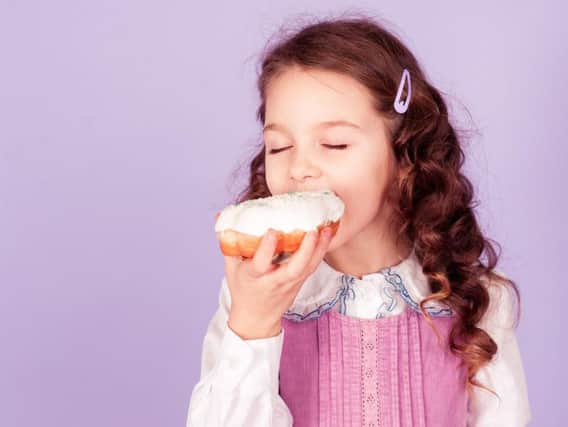Warning to parents over 'emotional feeding' of children


Children aged four to six handed treats to quieten them down were more likely to rely on comfort food high in calories as they approach their teenage years.
When overeating to cheer themselves up becomes a habit, they pile on the pounds.
Advertisement
Hide AdAdvertisement
Hide AdThe problem is also linked to the development of eating disorders like bulimia, anorexia and food bingeing.
The study which followed 801 youngsters for six years is the first to consider 'emotional eating' in schoolchildren with about two-in-three (65%) displaying it.
Parents - mostly mothers - were found to shape their children's behaviour by offering food to make them feel better when they were upset.
This behaviour is known by psychologists as 'emotional feeding'.
Vicious circle
Advertisement
Hide AdAdvertisement
Hide AdAnd those whose children calmed down when given chocolate or ice-cream for instance were more likely to carry on doing it - creating a vicious circle.
Professor Silje Steinsbekk, a psychologist at the Norwegian University of Science and Technology in Trondheim, said: "Understanding where emotional eating comes from is important because such behaviour can increase the risk for being overweight and developing eating disorders.
"If we can find out what influences the development of emotional eating in young children, parents can be given helpful advice about how to prevent it."
The study found young children whose parents offered them food for comfort when they were four and six indulged in more comfort eating at the ages of eight and ten.
Advertisement
Hide AdAdvertisement
Hide AdBut parents whose children were more easily comforted with food were also more likely to offer it to them in the first place - to engage in 'emotional feeding.'
So emotional feeding increased emotional eating - and emotional eating increased emotional feeding, said the researchers.
The findings published in Child Development held even after taking into account factors such as children's BMI (body-mass index) and initial levels of feeding and eating.
Moreover those who became most angry or easily upset at four were more likely to be at risk of emotional eating and feeding two years later.
Parent-child link
Advertisement
Hide AdAdvertisement
Hide AdThis contributed to the link between the comfort feeding and eating of the parents and children respectively.
Co-author Prof Lars Wichstrom said: "We know children who are more easily upset and have more difficulty controlling their emotions are more likely to eat emotionally than calmer children - perhaps because they experience more negative emotions and eating helps them calm down.
"Our research adds to this knowledge by showing children who are more easily upset are at highest risk for becoming emotional eaters."
Comfort foods include sweets, cakes or biscuits - often eaten by children and adolescents when they feel sad, upset or are in another bad mood.
But why youngsters eat emotionally has been unclear.
Advertisement
Hide AdAdvertisement
Hide AdSo the researchers - which included scientists from King's College London, University College London and Leeds University - followed Norwegian children over a long period of time in a bid to shed light on the problem.
They examined emotional feeding and eating habits in a representative group of four year-olds - looking at these issues again when they reached six, eight and ten.
Parents were asked to complete questionnaires describing their children's emotional eating and temperament.
This included how easily they became upset and how well they could control their emotions as well as their own emotional feeding.
Advertisement
Hide AdAdvertisement
Hide AdThose whose parents fed them more to soothe their negative feelings were more likely to eat emotionally later on.
The reverse was also found to be the case with parents of children who were more easily comforted by food being more likely to feed them for emotional reasons.
The researchers suggest instead of offering children food to soothe them when they are sad or upset, parents and other caregivers try to calm them by talking, offering a hug or soothing in ways that don't involve food.
Prof Steinsbekk said: "Food may work to calm a child but the downside is teaching children to rely on food to deal with negative emotions - which can have negative consequences in the long run."